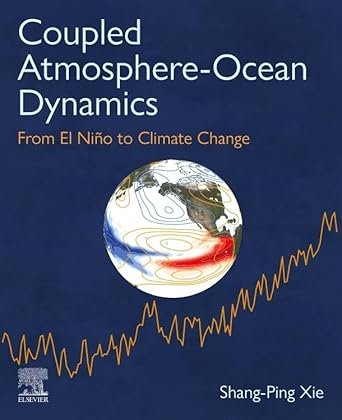Coupled Atmosphere-Ocean Dynamics of Climate Variability and Climate Change presents the patterns, mechanisms, and predictability of climate variability and anthropogenic climate change. Based on a graduate course the author has taught over 25 years, this book provides the physical foundation for those who are interested in fundamental questions such as: why climate varies from one year to another; how predictable climate is; and how climate will change in the face of increasing greenhouse gases in the atmosphere. This is the first comprehensive and systematic treatment of this subject that simultaneously draws on the latest research and is accessible for graduate students.
The book takes a step-by-step systematic approach to coupled ocean-atmosphere interactions. This allows a wide range of comparative views: climate modes among and across different tropical ocean basins, ocean feedback on the atmosphere (in and out of the tropics), and spontaneous internal oscillation versus externally forced climate change. Such comparative views offer unprecedented insight into the dynamics of climate variability and predictability. This book can be used as supplementary reading for advanced undergraduate students, as coursework in climate dynamics, modeling, variability, and change, and as a reference book and research monograph for researchers in ocean, atmospheric, climate, and earth system sciences.
Table of contents
Preface
- Introduction
1.1. Role of ocean in climate
1.2. Climate in the news
1.3. Fundamentals
1.4 General circulation models
1.5. Statistical methods
- Energy balance and transport
2.1. Planetary energy balance and greenhouse effect
2.2. Radiative imbalance and energy transport
2.3. Ocean heat transport
2.4. Atmospheric energy transport
Box 1.1. Surface salinity
Box 1.2. Thermodynamic variables of the moist atmosphere
- Tropical convection and planetary-scale circulation
3.1. Water vapor budget
3.2. Latent heat release in convection
3.3. Ocean temperature effect on convection
3.4. Equatorial waves
3.5. Planetary-scale circulation
3.6. Weak temperature gradient and SST threshold for convection
3.7. Outlook
Box 3.1. Discovery of equatorial waves
- The Madden-Julian Oscillation
4.1. Convectively coupled waves
4.2. Madden-Julian Oscillation
4.3. Moisture mode theory
- Summer monsoons
5.1. South Asian monsoon
5.2. East Asian monsoon
5.3. Asian summer monsoon system
5.4. West African monsoon
5.5. North American monsoon
5.6. Global monsoon
5.7. Discussion
Box 5.1. Land surface-atmosphere interactions
- Subtropical climate: Trade winds and low clouds
6.1. Trade wind climate
6.2. Cloud-regime transition
6.3. Climate feedback.
6.4. California climate
- Equatorial Oceanography
7.1. Dynamical models
7.2. Ocean response to wind stress forcing
7.3. Mixed-layer heat budget
- Coupled feedbacks and tropical climatology
8.1. Meridional asymmetry
8.2. Equatorial cold tongue and Walker circulation
8.3. Equatorial annual cycle
Box 8.1. Climate on the Galapagos
- El Niño, the Southern Oscillation, and the global influence
9.1. 1997-1998 El Niño
9.2. Bjerknes feedback.
9.3. Mechanisms for oscillation
9.4. Life cycle
9.5. Global influences
9.6. Barotropic stationary waves in the westerlies
9.7. Seasonal prediction
9.8. Summary remarks
Box 9.1. Road to coupled dynamics
- Tropical Atlantic Variability
10.1. Seasonal cycle
10.2. Zonal mode: Atlantic Niño
10.3. Meridional mode
10.4. Interactions with the Pacific
10.5. Climate modulation of tropical cyclones
10.6. Summary
- Indian Ocean variability
11.1. Seasonal cycle
11.2. Zonal mode: Indian Ocean dipole
11.3. Basin mode
11.4. Post-ENSO summer capacitor effect
11.5. Asian summer monsoon variability
11.6. Synthesis
Box 11.1. An intrinsic mode to the summer monsoon
- Extratropical variability and the influence on the tropics
12.1. Atmospheric internal variability.
12.2. Atmospheric forcing of SST: Lagged correlation diagnosis
12.3. Ocean dynamic effects
12.4. Extratropical influence on tropical climate
12.5. Deep meridional overturning circulation
12.6 Summary remarks
Box 12.1. Evolving views on extratropical variability
Box 12.2. Ocean front-atmosphere interaction
- Global warming: Thermodynamic effects
13.1. Climate feedback analysis
13.2. Global warming hiatus
13.3. Robust atmospheric changes due to thermodynamic effects
13.4. Surface acceleration of the subtropical ocean gyres
13.5. Discussion
Box 13.1. Coupled Intercomparison Project and radiative forcing scenarios
- Regional climate change
14.1. Regional patterns of tropical rainfall change
14.2. SST pattern dynamics
14.3. Regional uncertainty due to atmospheric circulation change
14.4. Ocean heat uptake
14.5. Aerosol effects
14.6. Historical climate change
14.7. Synthesis
Epilogue












Reviews
There are no reviews yet.